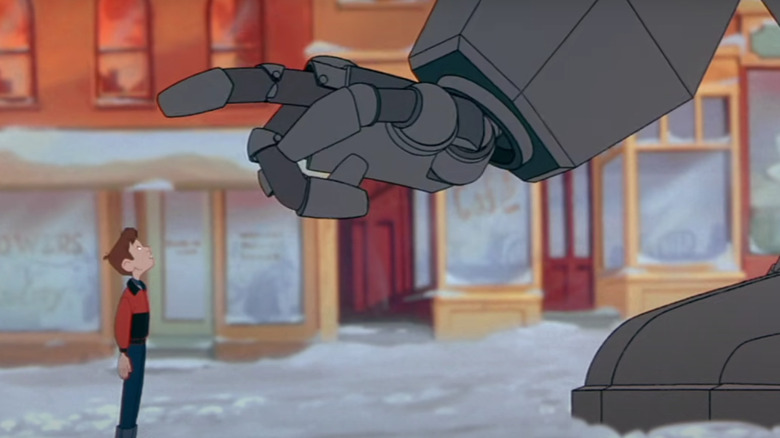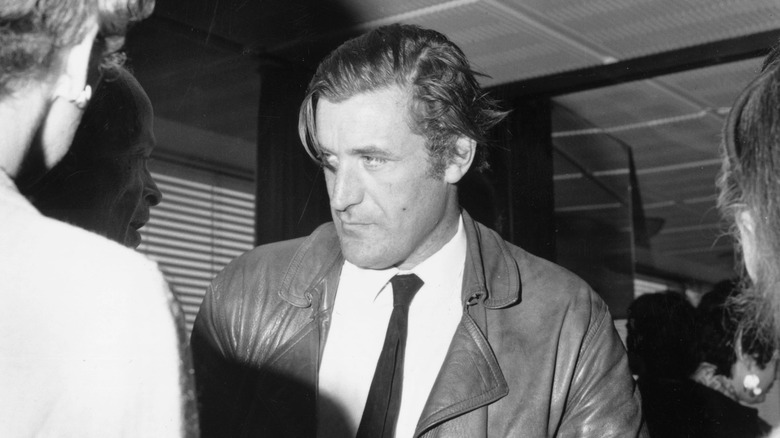The Message Of The Iron Giant Resonates More When You Learn About Brad Bird's Family Tragedy
"The Iron Giant" is a beloved film in the Warner Bros. animated canon. Though the movie underperformed during a competitive summer blockbuster season back in 1999 (via IndieWire), it has since gone on to develop a fervent cult following so substantial that the WB added the giant to both their competitive multiplayer fighting game "MultiVersus," as well as the massive Steven Spielberg tentpole "Ready Player One" (via Kotaku).
From the quaint setting to the ultimate message of non-violence behind the film, "The Iron Giant" has only grown in the hearts of viewers over the two decades and change that have passed since it was initially released. In fact, the animated classic was even brought back to theaters in 2015 with a new Signature Edition of the film (via Variety).
Of course, as "The Iron Giant" is a movie that's brimming with emotion and heart, it's no surprise that fans have remembered it so fondly over the years, even before it's director would go on to more well-known movies like "Ratatouille" and "The Incredibles." However, what viewers might not have realized is that the story behind the film is partially inspired by a tragedy from writer-director Brad Bird's own life.
Brad Bird's sister was murdered by her husband
As Brad Bird revealed in a documentary about the making of "The Iron Giant," the film and his desire to make it were heavily colored by the loss of his sister (via VT). Bird's sister lost her life when she was shot to death by her estranged husband. As Bird reeled from the tragedy, he came upon the book "The Iron Man" by Ted Hughes.
"My sister Susan, who I love very much and was very close to, died of gun violence," Bird said. "Pointlessly, she was killed by her husband. I was devastated." It is for this reason that "The Iron Giant" ends with a dedication that says simply: "For Susan." Bird was touched by the idea of a weapon that didn't want to be a weapon, and even used this concept when he pitched the movie.
"The idea I pitched to Warner Bros. after reading the book — when I said that I really liked it but I wanted to do something different with it — was I said, 'What if a gun had a soul?' Bird recalled. "That kind of stuck with them." It's easy to see why the executives were so moved by the idea, particularly if they had any inkling of what had occurred in Bird's life to make the notion behind the movie so meaningful to him. However, Bird wasn't the only one who saw the story as a metaphor for a personal tragedy.
Ted Hughes wrote the original story following his wife's death
British poet Ted Hughes wrote the book that "The Iron Giant" is based on after his wife Sylvia Plath died of suicide in 1963 (via The Ted Hughes Society). After years of suffering with depression and many suicide attempts, the author of "The Bell Jar" and "Colossus" eventually ended her life in her home (via Famous Authors). Later on, in 1968, Hughes penned "The Iron Man" in order to help his children to understand and grieve the tragic loss of their mother. As such, Hughes imagined the story as one of healing, of a body that could come back from seemingly any set-back
Amazingly, Pete Townshend of English rock group The Who also adapted the story as well, only he chose to use music to retell Hughes' moving story of love and sacrifice. Townshend brought "The Iron Man" to life as a concept album titled "The Iron Man: A Musical."
Though it is intensely sad to learn that so much tragedy and heart ache lie behind the "The Iron Giant," it's comforting to know that this pain and loss went on to inspire a story that would move multiple generations of readers, viewers and music fans across several decades. Anyone who's lost a loved one would surely find joy in being able to help others deal with their own tragic losses while inspiring fans everywhere to dream of a better world in turn.


